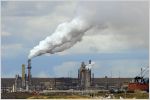Published in East Central Alberta Regional (Oct. 31, 2005)
It's a good idea to get your water well tested before a company conducts seismic operations or drills an oil or gas well on your land. Negotiate this before signing an agreement. The test provides baseline information that is useful to both you and the company if problems later arise with the water well.
The test should cover both water volume and water quality. A basic flow test involves pumping a well at a constant rate for two hours or longer and recording the water levels during the drawdown period. After pumping is complete, the water level should be recorded on the same time interval as the pumping period for two hours or until the water level recovers to at least 90 per cent of the non-pumping level.
A water sample should be collected near the end of the pumping period. A water quality test should include total dissolved solids, total hardness, alkalinity, pH, chlorides, sulphates, nitrates, nitrites, sodium, and perhaps some metals such as arsenic, which is naturally high in some areas. A test for total extractable hydrocarbons will establish whether there are oil- or gas-related substances in the water before drilling starts. Testing for gas content is especially advisable if a shallow coalbed methane well is to be drilled. Make sure that the laboratory carrying out the tests is accredited by the Canadian Association of Environmental Analytical Laboratories and ask for a copy of the test results, to keep for future reference.
If a company is targeting gas from a coal seam that may contain fresh (non-saline) water, it must conduct a Preliminary Groundwater Assessment even before it drills the well. Alberta Environment's Guidelines for Groundwater Diversion for Coalbed Methane/Natural Gas in Coal Development requires a field-verified survey of the location of water wells, springs and dugouts within at least 1.6 kilometres of the well and information about the well, aquifer, pumping rate, etc. The survey is done to collect information on area water supplies and does not include testing or collecting a water sample from the well to determine well yield or water quality.
If the company finds non-saline groundwater in the coal seam, it may have to be pumped out to reduce pressure so the gas can flow to the surface. If the water is non-saline, the company must apply to Alberta Environment for an approval to divert it and provide a detailed technical report about groundwater conditions in the area. The company may also be required to place a public notice in an area newspaper to notify the public about the application for diversion under the Water Act. Alberta Environment will direct the company to respond to statements of concern from the public. All this is described in Alberta Environment's Guidelines for Groundwater Diversion for Coalbed Methane/Natural Gas in Coal Development
There can be many reasons for a problem water well. They are explained in Water Wells That Last for Generations, which is available from Alberta Agriculture, Food and Rural Development or its website. If you think the water well problem was caused by oil or gas development, first try to resolve the issue with the company. Any outstanding problems with seismic activity should be reported to Alberta Sustainable Resource Development's geophysical inspector. Alberta Environment handles complaints about water wells that may be affected by oil and gas drilling. The Farmers' Advocate Office administers the Water Well Restoration or Replacement Program and can provide advice on other issues relating to oil and gas development. You can contact government offices by calling the government RITE line, toll-free at 310-0000.
Dr. Mary Griffiths is a senior policy analyst with the Pembina Institute. Her book, When the Oilpatch Comes to Your Backyard: A Citizens' Guide, is a complete guide to interacting with oil companies and is available from the Pembina Institute (www.pembina.org) or by calling the Drayton Valley office at 780.542.6272.
Dr. Mary Griffiths was a Senior Policy Analyst with the Pembina Institute until 2009.



